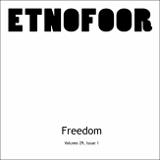Files in this item
Testing freedom : ontological considerations
Item metadata
| dc.contributor.author | Wardle, Huon | |
| dc.date.accessioned | 2017-11-07T10:39:11Z | |
| dc.date.available | 2017-11-07T10:39:11Z | |
| dc.date.issued | 2017-07-28 | |
| dc.identifier | 250912476 | |
| dc.identifier | ecc8919c-b747-41a2-a982-24d5776893bd | |
| dc.identifier.citation | Wardle , H 2017 , ' Testing freedom : ontological considerations ' , etnofoor , vol. 29 , no. 1 , 1 , pp. 11-27 . < http://www.jstor.org/stable/44318092 > | en |
| dc.identifier.issn | 0921-5158 | |
| dc.identifier.other | ORCID: /0000-0002-7179-8289/work/64034061 | |
| dc.identifier.uri | https://hdl.handle.net/10023/12015 | |
| dc.description.abstract | Who or what can be free, or not free? The question may seem mind-boggling on close inspection. To the extent that meaning is defined through reference, or acts of naming, different meanings of freedom deployed in daily life derive their significance from specific and contingent instructions that allow the particularities of freedom to be constituted. So we must begin by exposing ourselves to what Malinowski called the ‘universe of semantic chaos’ in which ‘freedom’ appears if we are to hope to approach freedom itself (1947). Further, this article argues that in order to address the complexities of freedom to their limits, an exploration not only of semantics (considerations of meaning) but also of its relation to ontology (considerations of existence) cannot be neglected. | |
| dc.format.extent | 178143 | |
| dc.language.iso | eng | |
| dc.relation.ispartof | etnofoor | en |
| dc.subject | GN Anthropology | en |
| dc.subject | T-NDAS | en |
| dc.subject.lcc | GN | en |
| dc.title | Testing freedom : ontological considerations | en |
| dc.type | Journal article | en |
| dc.contributor.institution | University of St Andrews. Social Anthropology | en |
| dc.contributor.institution | University of St Andrews. Centre for Cosmopolitan Studies | en |
| dc.description.status | Peer reviewed | en |
| dc.identifier.url | http://www.jstor.org/stable/44318092 | en |
This item appears in the following Collection(s)
Items in the St Andrews Research Repository are protected by copyright, with all rights reserved, unless otherwise indicated.

